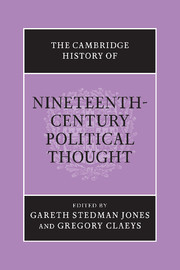Book contents
- Frontmatter
- Contents
- Contributors
- Acknowledgements
- Introduction
- I Political thought after the French Revolution
- II Modern liberty and its defenders
- 8 From Jeremy Bentham's radical philosophy to J. S. Mill's philosophic radicalism
- 9 John Stuart Mill, mid-Victorian
- 10 The ‘woman question’ and the origins of feminism
- 11 Constitutional liberalism in France
- 12 American political thought from Jeffersonian republicanism to progressivism
- 13 German liberalism in the nineteenth century
- 14 Visions of stateless society
- III Modern liberty and its critics
- IV Secularity, reform and modernity
- Biographies
- Bibliography
- Index
8 - From Jeremy Bentham's radical philosophy to J. S. Mill's philosophic radicalism
from II - Modern liberty and its defenders
Published online by Cambridge University Press: 28 July 2011
- Frontmatter
- Contents
- Contributors
- Acknowledgements
- Introduction
- I Political thought after the French Revolution
- II Modern liberty and its defenders
- 8 From Jeremy Bentham's radical philosophy to J. S. Mill's philosophic radicalism
- 9 John Stuart Mill, mid-Victorian
- 10 The ‘woman question’ and the origins of feminism
- 11 Constitutional liberalism in France
- 12 American political thought from Jeffersonian republicanism to progressivism
- 13 German liberalism in the nineteenth century
- 14 Visions of stateless society
- III Modern liberty and its critics
- IV Secularity, reform and modernity
- Biographies
- Bibliography
- Index
Summary
The object of this essay is to explore the main philosophical features of Jeremy Bentham's (1748–1832) radical thought and to identify those aspects which were later accepted or rejected by John Stuart Mill (1806–73) in his conception of philosophic radicalism. It is a study in the development and transmission of a set of ideas that helped to define the nature of philosophy and its application to politics in Britain and elsewhere in the first decades of the nineteenth century. It was believed and argued that truth in numerous fields, from politics to logic, possessed great utility (see Mill 1974, CWM, vii, pp. 11–12). The enhancement of understanding could lead to the relief of human suffering and the advancement of happiness. It would be wrong to see these fundamental beliefs as simply a development of a universal rationalism associated with the Enlightenment. Although Mill could write that ‘if there were but one rational being in the universe, that being might be a perfect logician’ (Mill 1974, CWM, vii, p. 6), neither Bentham nor Mill expected everyone to philosophise or seek the truth. But the recognition of the utility of truth led to a new kind of politics, theoretically open to all and inspired by a philosophical concern for truth, which dared, however gradually, to transform the lives of everyone. This transformation was to be achieved through a critical vision of society, released from oppression and ignorance to find security and happiness in new laws, institutions and practices.
- Type
- Chapter
- Information
- The Cambridge History of Nineteenth-Century Political Thought , pp. 257 - 294Publisher: Cambridge University PressPrint publication year: 2011
- 4
- Cited by



